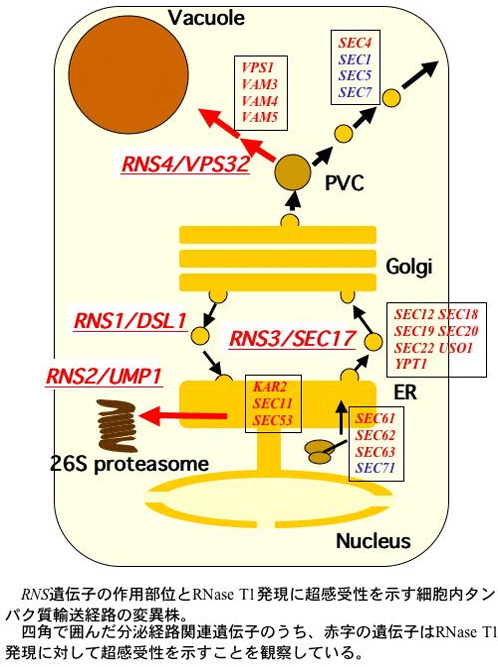While Aspergillus oryzae has been a host for the production of several industrially important proteins, a number of Aspergillus oryzae enzymes including alpha-amylase, glucoamylase, and nuclease S1 were successfully expressed in Saccharomyces cerevisiae. In contrary to this, the expression of the secretory enzyme, RNase T1, encoded by the rntA gene, caused severe growth inhibition of Saccharomyces cerevisiae. We clarified that the growth inhibition is dependent on the enzyme activity of RNase T1 and many mutant strains of the protein transport process especially between the endoplasmic reticulum - Golgi bodies and vacuoles are hypersensitive to the expression of RNase T1. It is thought that the expression of RNase T1 affects the mutant strains by inactivating or disabling the protein transport mechanism.
In order to search the factors responsible for protein transport efficiency in the yeast cells, we looked for the rns (RNase T1 sensitive) mutant strains which were hypersensitive to the expression of RNase T1, and genetically and biochemically analyzed about 38 strains. Four rns mutant strains with mutations in the following genes were identified.
RNS1 = DSL1 (Vesicl transport between endoplasmic reticulums - Golgi bodies)
RNS2 = UMP1 (Cytoplasm-proteasome)
RNS3 = SEC17 (Vesicle transport between the endoplasmic reticulum - Golgi bodies)
RNS4 = SNF7/VPS32 (Protein transport between endosomes - vacuoles)
Now, we are analyzing the function of new genes found by the interaction with RNS1/DSL1 genes, and investigating the response of host yeasts to the expression of alien proteins like RNase T1 by the analysis of the action of RNS4 genes and the interaction factors.

The schematic respresentation of the rns genes and the mutant strains which are hypersensitive to the expression of RNase T1 among the protein transport process in Saccharomyces cerevisiae.
We have observed that the following genes (in red) among the secretory process genes and among these the genes (in square) showed hypersensitive to the expression of RNase T1 .